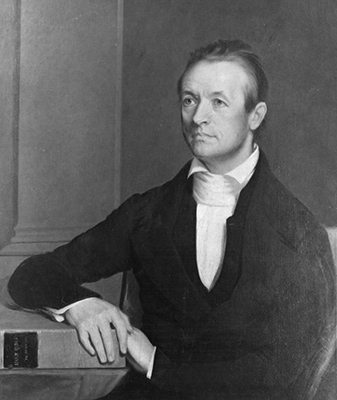Foreign Missionary Was Influenced by Brainerd, Carey, and the Word
by Jason G. DuesingEditor's note: This article was adapted from Adoniram Judson: A Bicentennial Appreciation of The Pioneer American Missionary (B&H Publishing, 2012). The collection was edited by Jason G. Duesing, academic Provost and Associate Professor of Historical Theology at Midwestern Baptist Theological Seminary. America's first formally-sent foreign missionary, Judson (Brown 1807) spent nearly 40 years in Burma (also known as Myanmar) and translated the Bible into Burmese.
At the start of his second year at Andover Theological Seminary, Adoniram Judson began to "reflect on the personal duty of devoting his life to the cause of missions."
 The idea of consecrating his life to go to the ends of the earth, though perhaps an abrupt concept for his family, was not a novel development in 1809 New England. Jonathan Edwards' Diary and Journal of David Brainerd appeared on the reading list for all students. Edwards' work told the story of the sacrificial life of the young New England minister, David Brainerd, spent reaching Native Americans with the gospel. As one historian relates, "To get through Andover without reading Brainerd was virtually unthinkable."
The idea of consecrating his life to go to the ends of the earth, though perhaps an abrupt concept for his family, was not a novel development in 1809 New England. Jonathan Edwards' Diary and Journal of David Brainerd appeared on the reading list for all students. Edwards' work told the story of the sacrificial life of the young New England minister, David Brainerd, spent reaching Native Americans with the gospel. As one historian relates, "To get through Andover without reading Brainerd was virtually unthinkable."Also in New England, especially among evangelicals, there existed a wide following of William Carey. Motivated by the Great Commission in Matthew 28:18-20, Carey, with the publication of his Enquiry in 1792, led British Baptists to support an effort to take the gospel to "those who have no Bibles, no preachers, nor many other common advantages which are taken for granted at home."
Judson's reading of Brainerd and awareness of Carey prepared him to respond to a sermon he read in September 1809 on Matthew 2:2, "For we have seen His Star in the East, and are come to worship Him." Claudius Buchanan, an Anglican priest and chaplain in the East India Company, took the account of Jesus' birth and emphasized the uniqueness of the Gentile visitors, the wise men following a star, as "representatives of the whole heathen world." Judson said that the reading of Buchanan's sermon had two effects on him. First, in February, 1810, while walking alone, he arrived at a moment of decision: "The command of Christ, 'Go into all the world, and preach the gospel to every creature,' was presented to my mind with such clearness and power, that I came to a full decision, and though great difficulties appeared in my way, resolved to obey the command at all events." Thus, at age 21, the Word of God, brought to his mind by the Spirit, solidified his future course.
Second, Buchanan's sermon focused Judson's gaze on the East. Judson began to read all that he could regarding countries in the East. He discovered a book by Michael Symes, An Account of an Embassy to the Kingdom of Ava, and within its pages found his future home. Symes, a British army officer sent to Burma in 1795, detailed his experiences in that land. As Courtney Anderson concludes, a civilized society in the East that was completely pagan and without the Word of God held forth a great opportunity in the mind of Judson.
With newfound clarity regarding his life and ministry, Judson searched for likeminded compatriots among the students and professors at Andover. He soon found friends among the members of a student missionary society. The Brethren had first formed at Williams College after committing to the missionary task while meeting in a field under a haystack during a storm. Led by Samuel Mills, these "Haystack Prayer Meeting" Brethren were joined by Judson and came to share his sanctified ambition for the East.
In response to a request from Judson and the Brethren, the Congregationalist General Association voted to form an American Board of Commissioners for Foreign Missions "for the purpose of devising ways and means, and adopting and prosecuting measures, for promoting the spread of the Gospel in heathen lands." They counseled Judson and the others to pursue prayer and continued studies until such openings presented themselves. They responded that they considered themselves "devoted to this work for life, whenever God, in His providence, shall open the way."





